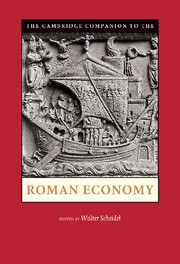Book contents
- Frontmatter
- Contents
- List of Figures
- Note on the Contributors
- Abbreviations
- The Roman world at the time of Marcus Aurelius
- 1 Approaching the Roman economy
- Part I Theory
- 2 Roman economic thought
- 3 The contribution of economics
- 4 Human capital and economic growth
- Part II Labor
- Part III Production
- Part IV Distribution
- Part V Outcomes
- Further reading*
- Bibliography
- Index
3 - The contribution of economics
from Part I - Theory
Published online by Cambridge University Press: 05 February 2013
- Frontmatter
- Contents
- List of Figures
- Note on the Contributors
- Abbreviations
- The Roman world at the time of Marcus Aurelius
- 1 Approaching the Roman economy
- Part I Theory
- 2 Roman economic thought
- 3 The contribution of economics
- 4 Human capital and economic growth
- Part II Labor
- Part III Production
- Part IV Distribution
- Part V Outcomes
- Further reading*
- Bibliography
- Index
Summary
Economics is about the allocation of resources. In the modern industrialized world, most goods and services are allocated through transactions, which in turn are mostly purchases and taxes. Goods are largely the outputs of early modern economies, while services – particularly labor services – are more typically the inputs. To understand how an economy works, we need to consider how inputs are directed to provide the outputs that people desire. There also are economic analyses of marriages and families, seeing marriage itself, fertility choice, and the raising of children as decisions that affect the allocation of resources. Ancient economies clearly differed from modern ones, but the principles of economics still hold true, and economics can bring clarity to the analysis of how resources were allocated in the ancient world.
I make this case in several steps. First, I describe the concepts of a market and of institutional economics. Second, I separate supply and demand and discuss the nature of economic incentives and equilibrium to show that economics may be useful even in the absence of market activity. Third, I introduce the concept of comparative advantage to explain trade. Fourth, I discuss possible economic growth as well as catastrophes like plagues. Fifth, I turn to money and prices. Sixth, I discuss the nature of information that can be used to test hypotheses about all these topics. The last two topics are discussed on this volume's web site.
- Type
- Chapter
- Information
- The Cambridge Companion to the Roman Economy , pp. 45 - 70Publisher: Cambridge University PressPrint publication year: 2012
- 5
- Cited by



